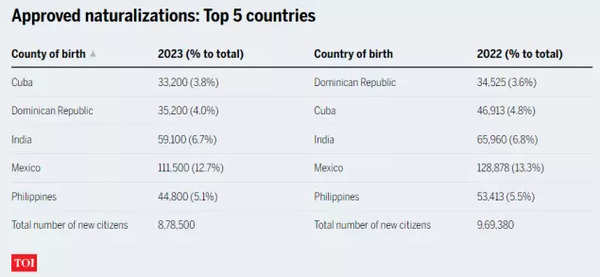The US citizenship and immigration services (USCIS) has announced a key change for lawful permanent residents seeking to renew their Green Cards. As of September 2023, USCIS will automatically extend the validity of Green Cards to 36 months for those who file Form I-90, the application used to replace an expiring or expired card.
“On Sept. 10, USCIS began printing amended receipt notices for individuals with a pending Form I-90.These receipt notices can be presented with an expired Green Card as evidence of continued status and employment authorization,” the USCIS stated.
Previously, the validity extension was set at 24 months, leaving many applicants with limited proof of their lawful status during renewal processing times. Now, by increasing the extension to 36 months, USCIS aims to address the long processing delays that many Green Card holders have faced.
Also read: 59K Indians obtained American citizenship in 2023, making up 6.7% of total new citizens
This update applies to individuals who have already filed, or will soon file, Form I-90. Those who submitted their applications before the change can expect amended receipt notices reflecting the new 36-month validity period. The receipt notices, which confirm the submission of Form I-90, can be used alongside expired Green Cards to prove lawful permanent resident status and employment eligibility.
This shift comes at a time when many immigration applicants face longer wait times due to increasing demand for Green Cards.
After holding a green card for five years, individuals can apply for US citizenship, with a reduced wait of three years for those married to US citizens. However, for many Indians, the wait for a green card can stretch into decades, complicating the path to citizenship.
Also read: Indians on green card queue in employment based 2 & 3 categories face huge backlog
In fiscal 2023, approximately 870,000 foreign nationals became US citizens, a decrease from the previous year’s 970,000. Among these new citizens, over 110,000 were Mexicans, making up 12.7% of the total, while around 59,100 Indians (6.7%) ranked second. The Philippines accounted for 44,800 new citizens, with other countries like the Dominican Republic and Cuba contributing to a combined total of 32%.
“On Sept. 10, USCIS began printing amended receipt notices for individuals with a pending Form I-90.These receipt notices can be presented with an expired Green Card as evidence of continued status and employment authorization,” the USCIS stated.
Previously, the validity extension was set at 24 months, leaving many applicants with limited proof of their lawful status during renewal processing times. Now, by increasing the extension to 36 months, USCIS aims to address the long processing delays that many Green Card holders have faced.
Also read: 59K Indians obtained American citizenship in 2023, making up 6.7% of total new citizens
This update applies to individuals who have already filed, or will soon file, Form I-90. Those who submitted their applications before the change can expect amended receipt notices reflecting the new 36-month validity period. The receipt notices, which confirm the submission of Form I-90, can be used alongside expired Green Cards to prove lawful permanent resident status and employment eligibility.
This shift comes at a time when many immigration applicants face longer wait times due to increasing demand for Green Cards.
After holding a green card for five years, individuals can apply for US citizenship, with a reduced wait of three years for those married to US citizens. However, for many Indians, the wait for a green card can stretch into decades, complicating the path to citizenship.
Also read: Indians on green card queue in employment based 2 & 3 categories face huge backlog
In fiscal 2023, approximately 870,000 foreign nationals became US citizens, a decrease from the previous year’s 970,000. Among these new citizens, over 110,000 were Mexicans, making up 12.7% of the total, while around 59,100 Indians (6.7%) ranked second. The Philippines accounted for 44,800 new citizens, with other countries like the Dominican Republic and Cuba contributing to a combined total of 32%.
According to the USCIS annual report, naturalizations during 2022 and 2023 comprised nearly 25% of the total for the past decade.
